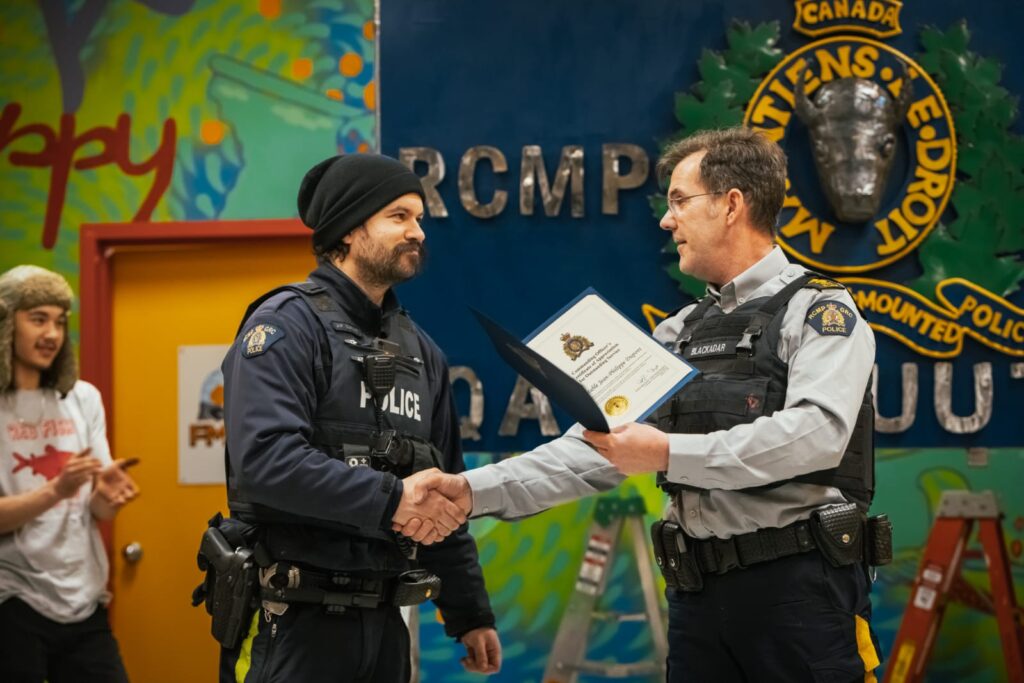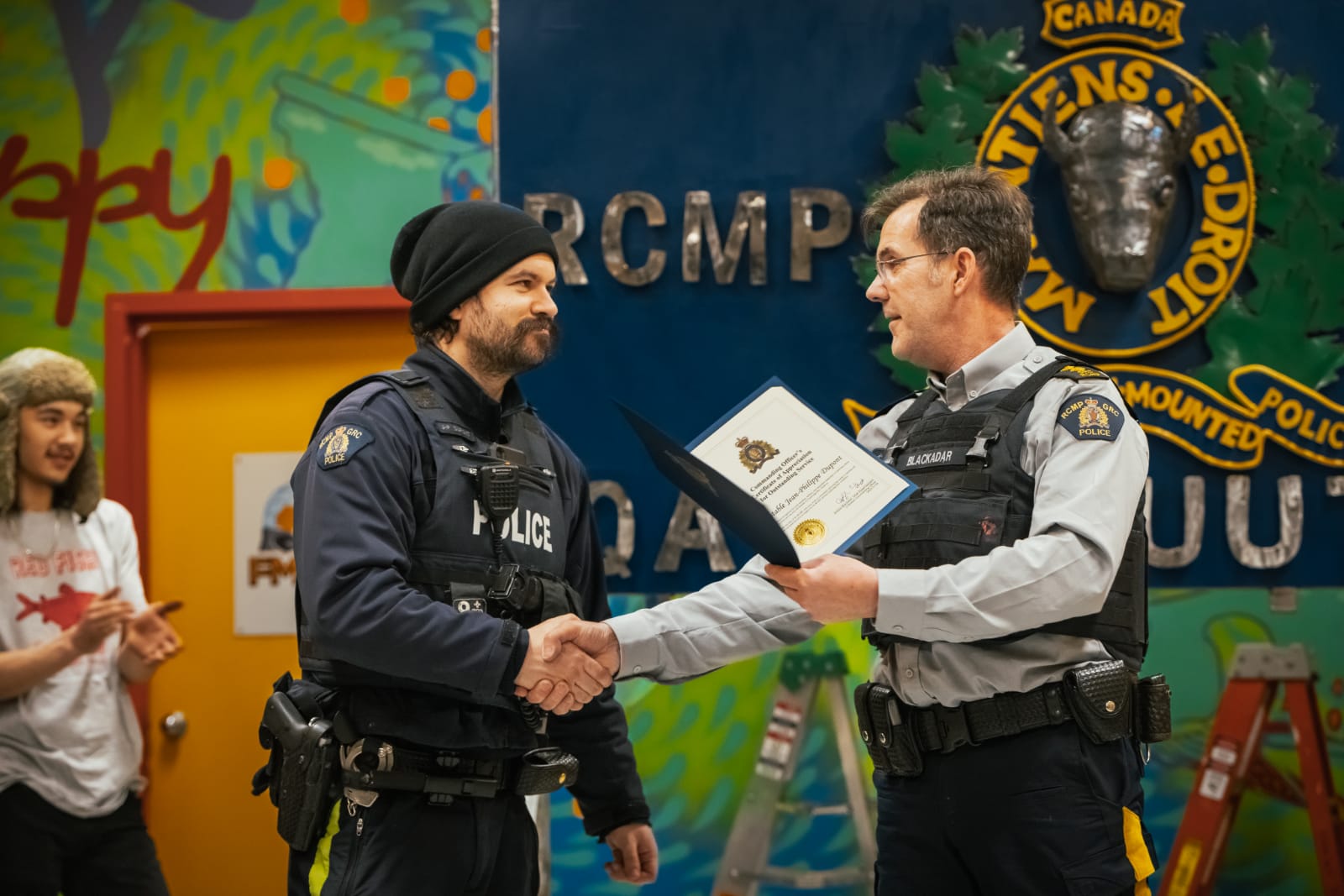Meet Cst. Jean-Philippe Dupont, affectionately known as “JP”, a dedicated Member of the Royal Canadian Mounted Police (RCMP) who embarked on a unique and transformative journey from policing the varied streets of Burnaby, BC, to the remote Inuit community of Cambridge Bay, NU.
His story is not just about law enforcement; it’s a testament to the power of community building and the humanity that binds us all.

Encouraging Members to volunteer to go North is crucial for the receiving communities and Member career development. Communities in northern Canada require policing services – just like every other community. It can be challenging, however, for Members to make that transition: jobs for spouses, access to amenities, and culture shock are just a few of the barriers.
For JP, transitioning from a fast-paced suburban policing environment to the close-knit community policing model required a shift in mindset. Representing authority and even government in these isolated corners of the world can be complex. It’s more than a role, it can feel like a burden at times.
The key lesson learned in the North is the importance of being confident, professional and thoughtful. At Depot, instructors teach that being upright and authoritative is part of a tactical consideration, a way of not being perceived as a target.
Bridging Hearts, Breaking Stereotypes
JP reflects on the importance of shedding the stereotypical image of a stern and distant officer, an image cultivated in the high-call-volume urban environment. In the north, building trust and fostering a sense of approachability is paramount. People are interconnected, and one negative interaction can ripple through the community, affecting not just the officer’s reputation but also the overall relationship between law enforcement and the residents.
The key lies in emotional awareness. Through openly discussing his personal experiences with clients, JP established genuine connections with people on a human-to-human level. He emphasized the significance of this approach for creating a lasting impact. However, JP acknowledged that, given the nature of the job, a police officer typically reveals vulnerability only when confident in their ability to handle rapidly and unexpectedly escalating situations.
A Northern Symphony
During his time in the North, JP took a unique approach to bridge the gap. Recognizing the need for positive male role models in the lives of young boys, he initiated a new chapter for the Boys Club Network. This mentorship program brought together local mentors and boys for meaningful discussions and shared experiences while sharing a meal. It not only created a safe space for the boys but also served as a platform for JP to connect with the community on a deeper level.
The impact of JP’s efforts became evident when individuals he arrested would speak highly of the Boys Club, highlighting the positive influence it had on their children. The program became a bridge, breaking down barriers between law enforcement and the community.
In addition to his regular duties, JP showcased his musical talents by occasionally bringing his guitar to meetings. Whether it was a casual gathering or a youth event, he would strum away, creating an atmosphere of joy and camaraderie.
JP’s connection with the youth didn’t stop at music; he also had a flair for magic. After learning a few tricks, he became a beloved figure known for his enchanting performances. Inquire with his former colleagues, and they’ll recount how it became a regular occurrence for children to drop by the police detachment solely to inquire, “Can JP perform a magic trick?”. His repertoire included feats with paperclips, playing cards, rings, and even simple pieces of paper. The community soon embraced his dual identity as both a police officer and a magician who could make wonder happen with a simple deck of cards.
In an unexpected and heartwarming twist, he would occasionally perform magic tricks or play his guitar for people in holding cells, especially when they were there for prolonged periods. This seemingly small act brought moments of joy and distraction to those experiencing a challenging time. .
JP’s advice for those looking to make a difference in their communities is both practical and insightful. By collaborating with existing organizations that share similar goals, he emphasizes the efficiency of leveraging available funds and resources. His ability to seamlessly transition between law enforcement, music, and magic showcased the power of compassion and creativity in unexpected places, leaving a lasting impact on the hearts of those he served. Because JP uses music and magic as an additional tool to foster connections with those he serves.
Frozen Horizons, Thawing Stress
In the midst of JP’s journey, the transition from the fast-paced urban environment to the serene landscapes of the north brought with it a profound realization—the reality of stress. Moving from the hustle and bustle of patrol/office everyday life to the tranquility of a home required a significant period of adjustment. The abrupt shift demanded introspection and adaptation, an acknowledgment that the pace of life had changed. This transition, as JP discovered, isn’t just geographical but also a mental and emotional adjustment that necessitates time and even therapeutic support to rediscover that delicate balance between professional duties and personal well-being.
In this seemingly tranquil northern setting, it appeared that life was calmer than in Burnaby. However, despite the outward calm of the city, JP found himself more stressed in the North than in the bustling urban environment. The reason being, the weight of everyone’s problems seemed to rest squarely on his shoulders. As he encountered numerous challenging situations, it became an expected part of the job, amplifying the sense that only a handful of RCMP Members were there to manage it all. The true depth of stress hit him profoundly when I departed from the north. It was only then that he realized the extent of the stress he had been carrying, unaware of its intensity while he was up north.
Embracing Shared Humanity Beyond Rules and Authority
In the north where icy winds whisper tales of resilience and community, Cst. Jean-Philippe Dupont’s journey culminates in a profound revelation—recognizing the inherent value of human life. Behind the uniform, beyond the badge, every experience, every individual, there is a harmonious dance of shared humanity. In breaking stereotypes, fostering genuine connections, and navigating the ebb and flow of life, JP’s story echoes the timeless truth that, beyond the strict rules and authority, we are all human. It is in this collective recognition that the promise of a compassionate and understanding future takes root, transcending borders and embracing the universal threads that bind us together.
In a bustling city, after completing your shift and navigating through a tumultuous night with encounters beyond imagination, you retreat to the solace of your home, away from the demands of work. There, you can reflect on the events that unfolded. Contrastingly, in small communities, following a tumultuous night, you park your police vehicle, stow away your uniform, only to be roused from sleep by another police call from a community member seeking assistance. Eventually, you realize that there’s no distinct time for decompression; you are a police officer around the clock, both in the eyes of the community and within your own mind. Achieving a clear balance between work and personal life becomes nearly impossible. To truly savor your entire northern experience, you must embrace it with all its challenges and opportunities to make a positive impact.
JP’s story is a testament to the transformative power of community-oriented policing. In the vastness of the north, where trust is a precious currency, JP’s initiative and genuine connection have not only earned him respect but have also created lasting positive change. Policing, in his narrative, becomes more than just a profession; it becomes a shared journey of understanding, empathy, and mutual respect.


